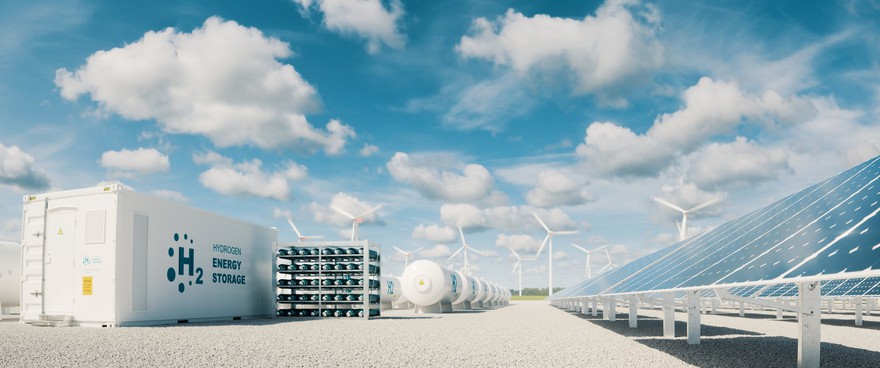Hydrogen stocks are publicly traded companies seeking to capitalize on the enormous potential of hydrogen. This energy source emits no greenhouse gases when burned. The only waste product is water vapor, making it a cleaner energy source than fossil fuels such as natural gas, oil, and coal. These features make it a potential future source of lower-carbon energy.

The drawback of hydrogen as a fuel source is that it's rarely found in an easily extractable form. Although hydrogen can be produced from a variety of sources, most methods emit greenhouse gases, and clean hydrogen has not yet been produced at the scale needed to be economically competitive with fossil fuels.
However, that could change in the coming years. Several companies are working hard to tap into the enormous promise of this potentially emission-free fuel.
What to know about investing in hydrogen
There are a few things investors should know about the hydrogen industry before investing in the sector, including:
- Types of hydrogen: There are several ways to produce hydrogen, some of which produce carbon dioxide as a byproduct. The industry refers to hydrogen produced from burning natural gas as "blue hydrogen," which requires carbon capture and storage (CCS) to isolate greenhouse gas emissions. "Green hydrogen," produced by renewable energy to power an electrolyzer that splits hydrogen from water molecules, doesn't emit any greenhouse gases. Green and blue are two of the many colors used to classify hydrogen by its production method and emissions profile.
Carbon Credits
- Similar to batteries: Hydrogen fuel cells work much like batteries, generating electricity through an electrochemical reaction. However, hydrogen fuel cells are refueled with more hydrogen rather than being recharged like a traditional battery.
- Multiple current uses: Hydrogen fuel cells already have many uses. They're found in many motorized vehicles (e.g., cars, trains, buses, maritime vessels, and trucks) and also serve as a stationary power source.
- Massive market opportunity: Hydrogen has vast potential as a replacement fuel. It could one day replace natural gas in the pipeline system to generate electricity at power plants and as a fuel source for our homes. Due to its potential, some forecasts peg the future value of the clean hydrogen market as high as $11 trillion.
- Costs: Although clean hydrogen holds great promise as a potential emissions-free fuel source, it's costly to produce. It costs as little as $1.50 per kilogram to produce hydrogen from natural gas and between $3 and $12 per kilogram to produce clean hydrogen. The U.S. Department of Energy wants to reduce the cost of clean hydrogen to $1 per kilogram over the next decade to make it a more competitive fuel source.
Best hydrogen stocks to buy in 2026
Given the potential of clean hydrogen, a growing number of companies are investing in the sector. Many energy and industrial companies are in the early stages of exploring the possibility of hydrogen energy.
However, a handful of companies are already emerging as early leaders in the sector. Here are seven leading hydrogen companies to keep an eye on as the industry matures.
| Name and ticker | Market cap | Dividend yield | Industry |
|---|---|---|---|
| Linde (NASDAQ:LIN) | $205.2 billion | 1.37% | Chemicals |
| Bloom Energy (NYSE:BE) | $35.6 billion | 0.00% | Electrical Equipment |
| Plug Power (NASDAQ:PLUG) | $3.1 billion | 0.00% | Electrical Equipment |
| Ballard Power Systems (NASDAQ:BLDP) | $784.9 million | 0.00% | Electrical Equipment |
| Air Products And Chemicals (NYSE:APD) | $58.6 billion | 2.72% | Chemicals |
| Cummins (NYSE:CMI) | $80.3 billion | 1.31% | Machinery |
| FuelCell Energy (NASDAQ:FCEL) | $446.3 million | 0.00% | Electrical Equipment |
1. Air Products
Air Products (APD +1.91%) is a global leader in supplying industrial gases and liquefied natural gas (LNG) processing technology and equipment. It's also one of the world's largest suppliers of merchant hydrogen and a leader in hydrogen fuel infrastructure. It has more than 100 hydrogen plants with the capacity to produce 7 million kilograms of fuel each day.

NYSE: APD
Key Data Points
Air Products (APD +1.91%) aspires to be a leader in providing solutions to the world's energy and environmental challenges through gasification, carbon capture, and clean hydrogen. It has several major hydrogen projects underway that it expects to complete in the coming years.
For example, it has completed 80% of the construction of its NEOM Green Hydrogen Project in Saudi Arabia, which should begin production by 2027. It's also working on a potential $8 billion blue hydrogen project in Louisiana that it could approve by the middle of 2026. In December 2025, Air Products reported that it was in advanced negotiations to potentially connect these projects to Yara's world-scale ammonia network.
2. Ballad Power Systems

NASDAQ: BLDP
Key Data Points
Ballard Power Systems (BLDP -0.95%) is a pioneer in the hydrogen industry. The Canadian company debuted the world's first fuel cell bus more than 30 years ago. Today, Ballard produces zero-emission fuel cells for the electrification of buses, commercial trucks, and marine vehicles, as well as stationary power solutions.
Ballard reported strong third-quarter results in November 2025. Revenue rocketed 120% year over year to $32.5 million, driven by bus and rail deliveries. The company also had a strong order intake of $19.1 million and saw a positive reception for its newest product, FCmove-SC, its next-generation transit fuel cell module.
Additionally, the company is optimistic about the potential opportunity in the stationary power market. Several lower-carbon and renewable hydrogen projects are nearing a final investment decision, which could drive growth in the fuel cell market in the coming years.
3. Plug Power

NASDAQ: PLUG
Key Data Points
Plug Power (PLUG -3.90%) is a pioneer in the hydrogen fuel cell industry. It created the first commercially viable market for hydrogen fuel cell technology and has deployed an industry-leading 72,000 fuel cell systems for the e-mobility market (using electric powertrain technologies to power vehicles and fleets).
It's one of the world's largest hydrogen buyers and operates a leading hydrogen refueling network in North America with more than 285 fueling stations. Plug Power is building an end-to-end green hydrogen network to produce, store, and deliver the fuel across North America and Europe.
Plug Power has struggled to fund its operations and growth over the years due to its heavy operating losses. However, cost-cutting initiatives and new financing secured in November 2025 put the company on track to fully fund its current business plan. Additionally, the company partnered with a U.S. data center developer to explore the potential of providing auxiliary and back-up power solutions to data centers using its advanced fuel cell technology.
4. Bloom Energy

NYSE: BE
Key Data Points
Bloom Energy's (BE -0.78%) mission is to produce clean, reliable, and affordable energy. The company has developed the Bloom Energy Server, an electric power-generation platform. It also created the Bloom Electrolyzer, using the same solid oxide technology as its Bloom Energy Server. The product can produce clean hydrogen 15% to 45% more efficiently than others on the market.
Bloom Energy believes the Bloom Electrolyzer is a major leap forward for hydrogen. It hopes the technology will enable heavy industries, such as steel, chemicals, cement, and glass manufacturing, to decarbonize.
Bloom Energy can pair its Bloom Electrolyzer with solar energy and wind energy to generate green hydrogen, which it can store and eventually turn back into electricity for future use. It has the potential to be the solution of choice for powering artificial intelligence (AI), including data centers and businesses using the technology for productivity gains.
In October 2025, Bloom Energy and Brookfield Asset Management (BAM +1.09%) announced a strategic AI infrastructure partnership. Brookfield will invest as much as $5 billion to deploy Bloom's advanced fuel cell technology in AI data centers in the future.
5. Linde

NASDAQ: LIN
Key Data Points
Linde (LIN +1.43%) has developed several technologies to efficiently compress and safely refuel hydrogen. It also offers technologies to lower hydrogen's carbon emissions through carbon capture and storage.
Linde signed a deal in 2024 to build a 100-megawatt renewable hydrogen plant for Shell (SHEL +0.96%) in Germany, which it expects will begin commercial operations in 2027.
In June 2025, Linde signed a long-term agreement to supply industrial gases to a $4 billion low-carbon ammonia facility currently under construction in Louisiana. Linde will invest $400 million into a new on-site facility, which will complement the company's existing hydrogen and syngas (synthesis gas) infrastructure in the region.
While Linde is an early hydrogen leader, it has been skeptical of the sector's near-term growth prospects. The company believes it will take five to seven years for hydrogen technology to mature. As that happens, the industry will be able to approve more commercially viable projects.
6. Cummins

NYSE: CMI
Key Data Points
Cummins (CMI +2.78%) is a global power solutions company. It makes advanced diesel, natural gas, electric, and hybrid powertrains and powertrain-related parts. Among its solutions are fuel cell and electric power technologies and hydrogen production technologies. Accelera by Cummins is its business segment dedicated to zero-emissions technology, such as fuel cell engines.
In November 2025, the company announced that it was undertaking a strategic review of the electrolyzer businesses within its Accelera segment due to significantly weaker prospects for demand. Cummins, like others in the hydrogen sector, has had to meaningfully temper their hydrogen adoption expectations over the past year.
7. FuelCell Energy

NASDAQ: FCEL
Key Data Points
FuelCell Energy (FCEL +7.99%) is a global leader in delivering distributed baseload energy (energy produced on-site to provide steady power to a building). The company's proprietary fuel cell technology features carbonate fuel cells (those powered by natural gas and biofuels) and hydrogen fuel cells. The company also makes carbon recovery and carbon capture systems.
FuelCell Energy has shifted its focus to the data center market in recent months, where it sees significant opportunities for its efficient and resilient power solutions. The company has simplified its product line and shifted its sales and marketing focus to capitalizing on data center opportunities.
Benefits and risks of investing in hydrogen stocks
Investing in hydrogen stocks has its share of pros and cons. Some benefits of investing in hydrogen stocks include:
- Growth potential: Hydrogen has the potential to grow into a multitrillion-dollar global market in the coming decades, which could fuel strong gains for top hydrogen stocks.
- Cleaner: Hydrogen (green hydrogen and blue hydrogen paired with CCS) is a cleaner fuel source compared to oil and natural gas, so investing in the sector can help support the environment.
On the other hand, some risks of investing in hydrogen stocks include:
- Market challenges: The hydrogen market can be very challenging due to the volatility of hydrogen prices and changing government policies. These and other issues have caused some hydrogen companies to cancel major expansion projects.
- Higher risk companies: Many hydrogen companies have higher risk profiles due to their weaker balance sheets and lack of profitability.
How to invest in hydrogen stocks
Anyone can invest in hydrogen stocks. Here's a step-by-step guide on how to add one to your portfolio:
- Open your brokerage app: Log in to your brokerage account where you handle your investments.
- Search for the stock: Enter the ticker or company name into the search bar to bring up the stock's trading page.
- Decide how many shares to buy: Consider your investment goals and how much of your portfolio you want to allocate to this stock.
- Select order type: Choose between a market order to buy at the current price or a limit order to specify the maximum price you're willing to pay.
- Submit your order: Confirm the details and submit your buy order.
- Review your purchase: Check your portfolio to ensure your order was filled as expected and adjust your investment strategy accordingly.
Future outlook for the hydrogen fuel industry
Several energy companies have delayed or canceled hydrogen projects over the past year due to challenging market conditions. However, the industry's outlook remains bright. According to the International Energy Agency, "Projects that are operational, under construction, or have reached a final investment decision by 2030 are set to increase more than fivefold from 2024 levels to more than 4 million tonnes per year. An additional 6 million tonnes per year also has strong potential to become operational by 2030 if effective policies to ensure demand are implemented." This robust growth rate bodes well for hydrogen stocks.
Related investing topics
Investment considerations for hydrogen stocks
Hydrogen energy has enormous potential. The emissions-free fuel could help decarbonize heavy industry, replace natural gas, and store renewable energy, paving the way for a truly net-zero world. It represents a multitrillion-dollar market opportunity.
However, hydrogen is still developing as a commercially viable fuel source. The industry needs to scale up and reduce costs to become competitive with fossil fuels and other emerging technologies, such as battery storage. The industry also relies on government support in the form of loan guarantees and other tax incentives, which can change based on the outcome of elections.
Given these factors, investors should evaluate whether they can handle the risks associated with investing in hydrogen stocks. Many pure-play hydrogen companies are unprofitable, making them riskier. Meanwhile, other larger companies involved in the sector make most of their money elsewhere.
As a result, investors might want to watch the industry from the sidelines and wait for the sector to develop. Alternatively, you can consider investing in hydrogen by taking a basket approach (buying several different hydrogen stocks with varying risk profiles) or through a hydrogen ETF.











